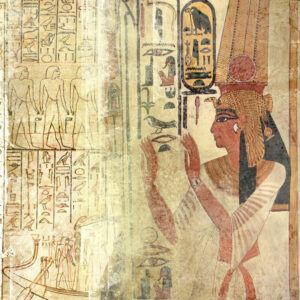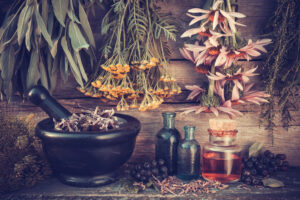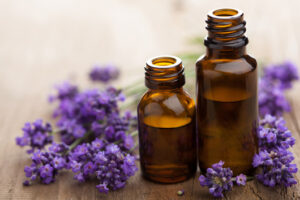Tahe Art of Hwaling With Essential Oils and Herbs
Ancient Egypt was a civilisation renowned for its knowledge and apply of cosmetics and ointments. Cleopatra was famed for her beauty also equally her unusual beauty regimes. The ancient Egyptian god of perfume was Nefertum, who was also the god of healing. This inextricable link betwixt aroma and healing spread through many aspects of their culture.
At present, thousands of years after, we proceed to apply many of the traditions this culture discovered and practiced, essential oils and the utilise of botanicals as healing agents are widespread. Granted, they've been updated a little since then!
The Nile River
Prove of the primeval uses of essential oils has been found dating back over 5,000 years to ancient Egypt. Egyptian lodge and civilisation sprung up around the River Nile because it was a source of life on the continent of Africa.
Not only did the river provided an abundance of plants, which gave opportunities for a rich culture to abound, but the humming civilisation that sprung upwardly effectually it atomic number 82 to advancements in writing, agriculture, and urbanization.
As a result, developments in herbal medicines, and botanical ingredients in treatments soon followed. More than specifically, essential oils started to be adult and used.
The Ebers Papyrus
The biggest indicator of much of these medicinal advancements came in the discovery of a 110 page, 65 feet long papyrus. Known every bit the Ebers Papyrus, it gave researchers a unique insight into the medicinal practices of ancient Egyptians. The scroll dates back to 1550 BC (although information technology is idea to exist a copy of a much older original) and is the largest record of ancient Egyptian medicine in known existence.
There are over 700 recipes, remedies, and incantations for a variety of ailments that Egyptian citizens suffered. With such an extensive document, it would appear that people adept these treatments for many years with at least some level of success.
One of the recipes contained in the certificate suggests cooking herbs and fruit in oil, and anointing it to "remedy the bowels." A very basic and early use of essential oil.
Cleanliness and Essential Oils
 Ancient Egyptian culture held body-care and cleanliness to such importance that it transcended economic status. Records show that body oil was applied daily past almost all citizens every bit a course of moisturizing and skin protection. It was besides oftentimes issued in the form of wages to even the everyman classes of workers. Cleanliness was paramount!
Ancient Egyptian culture held body-care and cleanliness to such importance that it transcended economic status. Records show that body oil was applied daily past almost all citizens every bit a course of moisturizing and skin protection. It was besides oftentimes issued in the form of wages to even the everyman classes of workers. Cleanliness was paramount!
Unpleasant smells had associations of impurity, and skillful smells indicated a sacred presence. It was for this reason that priests were the only authority allowed to use aromatic oils. They were seen every bit necessary to be at i with the gods, and each deity had its ain fragrance dedicated to it. The statues of these gods would have been anointed with these aromatic oils.
Mummification
Possibly the most famous and pertinent use of essential oils in aboriginal Arab republic of egypt is their use in the mummification procedure. Various aromatic gums such as cedar and myrrh were rubbed onto the bodies to ready them for mummification and burial, traces of which can yet be plant on the bodies today.
Additionally, pharaohs have been known to be buried with jars of essential oils. Tutankhamun had jars that were believed to take held lotus flower essence in his tomb. This was a very special olfactory property, with the lotus bloom condign a symbol of 'Upper Egypt', growing in abundance forth the Nile. Conspicuously, these oils were incredibly highly revered and played a significant office in ancient Egyptian social club.
Oil Extraction
Without the employ of modernistic technologies which extract oils from botanicals with ease, how were these oils obtained?
1 such suggestion is that the botanical would have been boiled in water and the resulting oil-rich steam inhaled. For topical use, the chief ingredient such as bark would accept been ground downward incredibly finely and mixed with olive oil.

This would have then been heated and pressed through a wool cloth, and the olive oil and essential oil mixture would accept been stored in clay jars for use later on on.
A farther technique known equally 'enfleurage' saw animal fats spread out on a apartment surface and sprinkled with the plants from which they wanted to extract the oil. Over several days, the fatty captivated the organic compounds of the botanicals.
The plant matter would have been replaced a number of times until the fatty had reached the desired concentration. The infused fatty could then exist applied to the skin as a treatment for a diversity of ailments.
Modern Use
The wisdom of essential oils for use in a variety of ways for both concrete and mental conditions, have been passed down the generations and spread around the entire world. Essential oil'southward use today hasn't changed too much from its historical use, but modernistic life certainly provides a greater diverseness of opportunities for its use.
We are more stressed, we're breathing in much dirtier air, nosotros're suffering more from insomnia, and our diets are poorer. Essential oils accept never been more pertinent.
Essential oils are captivated into the body in two primary ways – inhalation, and assimilation. They can be added to baths to relieve muscle pain, sprayed on pillows or used in a diffuser to aid peaceful sleep, and have fifty-fifty been found to boost mood and reduce low.
Beyond the physical benefits, many essential oils are used for spiritual purposes. As previously mentioned, in Egypt, they were used to indicate a sacred presence. Priests used the oils to feel closer to the deities associated with those detail scents. In a similar vein, most essential oils used today have spiritual backdrop. For example, basil promotes trust and integrity, lavender restores and calms the heed, and lemon brings clarity and awareness.
The physical and spiritual benefits of using essential oils take roots deep in cultural history. Millions of people used and keep to use these oils in remarkably like ways. Their applications and associations are wide-reaching, then if you haven't already discovered them, y'all could be missing out. Anyhow, who wouldn't want to feel like royalty for a day?
Sources:
https://world wide web.youngliving.com/blog/essential-oils-in-the-aboriginal-world-pt-i/
https://www.youngliving.com/web log/?p=7858
https://healingscents.net/blogs/learn/18685859-history-of-essential-oils
http://areejaromatherapy.com/aromatherapy-in-arab republic of egypt/
http://www.crystalinks.com/egyptmedicine.html
http://www.ancientegyptonline.co.uk/perfume.html
Powered by Akash, WordPress, and Enhanced by IWB
Source: https://www.thespiritscience.net/2016/08/21/ancient-oils-3-ways-the-egyptians-used-essential-oils/
0 Response to "Tahe Art of Hwaling With Essential Oils and Herbs"
Post a Comment